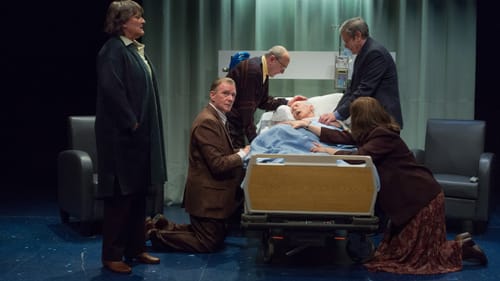Stay in the Loop
BSR publishes on a weekly schedule, with an email newsletter every Wednesday and Thursday morning. There’s no paywall, and subscribing is always free.
They don’t wanna grow up
People’s Light presents Sarah Ruhl’s ‘For Peter Pan on Her 70th Birthday’

We should all be so lucky to receive a gift like For Peter Pan on Her 70th Birthday, which Sarah Ruhl wrote for her mother, Kathleen. A witty and moving meditation on age, loss, and the bond between siblings, the work will surely resonate with anyone who’s lost a parent, loved a brother, or banged their head in frustration over the unending demands of being part of a family. People’s Light stages the local premiere, in a production that captures the piece’s charm without quite landing the mournful, searching qualities underpinning it.
Grown-up orphans
The title refers to Kathleen Ruhl’s signature role as a teenage thespian in Davenport, Iowa—the ageless boy who rules over Neverland in a state of perpetual childhood. Ruhl connects the themes of J.M. Barrie’s beloved, surprisingly dark fairy tale to the vagaries of adult life as five grown siblings deal with the death of their father and its aftermath. The quest for eternal youth—the continuation of innocence, a parade of carefree days—serves as a searing contrast to the reality of hospitals, ailments, and coffin shopping.
“If you don’t grow up, you don’t have to die,” observes Ann (Marcia Saunders), the oldest sibling, in the midst of a wide-ranging conversation that encompasses faith, marriage, politics, and the fear of growing old. After she and the rest of her brood—played by People’s Light veterans Stephen Novelli, Peter DeLaurier, Leonard C. Haas, and Mary Elizabeth Scallen—leave the hospital in the wake of their father’s passing, they confront the fact that, even as they near the age of Social Security and grandchildren, they still feel like orphans, alone and unmoored. It’s a simple truth about bereavement that Ruhl captures with unembellished beauty. Neverland looks promising when you consider the alternative.
Experiments, humor, and gut punches
Throughout her career, Ruhl has established herself as a sly master of subverting the expected, whether through narrative experimentation, surprising humor, or a gut punch that comes out of nowhere. For Peter Pan includes all these elements, fitting into its slim 80-minute running time a host of surprising and challenging tonal shifts. In a preface to the play’s published script, the author acknowledges the influence of Japanese Noh drama, a form that draws heavily from ritual and from interactions between the living and the dead. Even after shuffling off the mortal coil, Dad (Graham Smith) remains a looming presence over the drama—in corporeal form and as a prime mover for his children’s interactions and clashes.

Ruhl divides her play into three discrete scenes—another remnant of the Noh structure—and the result is sometimes jarring and technically ambitious. The audience follows the family from the hospital to their childhood home, and ultimately to a conjured Neverland, where youth still reigns. Humor blends with pathos, just as verisimilitude blends with performative awareness. Tony Cisek’s slightly exaggerated sets, lighted by Dennis Parichy, capture the whimsical nature so central to this duality. Marla J. Jurglanis’s costumes allow the actors to shift effortlessly from real life to the realm of make-believe.
A deepening dynamic?
Yet Abigail Adams’s direction too often suggests easy sentimentality in a play that would benefit from an astringent edge. The conversations that occupy the siblings in the long second scene, which replicate the aftermath of an Irish wake, seem quaint when they should be cutting. And when the action moves to the world of fantasy, Adams struggles to suggest the dichotomy between childish wish fulfillment and grown-up resignation. Ruhl’s caustically funny lines—sample: “Everybody has a shadow, Peter Pan. Honestly, you should have gone to Jungian analysis”—never quite pop as they should.
And surprisingly, for a company that has acted together dozens if not hundreds of times, the sense of a familial bond between the actors never fully gels. Individual performances succeed: Saunders imbues Ann with a wellspring of unforced levity and Smith, in a nearly wordless performance, makes his presence essential. Still, a sibling shorthand doesn’t get fully established, and a certain tentativeness that persisted throughout the opening night performance suggests a lack of adequate rehearsal.
Perhaps the dynamic will deepen over the course of the run. What’s already evident is the subtle power of Ruhl’s play, which I’d rank near the top of the dozen or so works of hers I’ve encountered over the past 15 years. While this People’s Light production doesn’t achieve perfect flight, the play itself positively soars.
What, When, Where
For Peter Pan on Her 70th Birthday. By Sarah Ruhl, directed by Abigail Adams. Through May 12, 2019, at People’s Light & Theatre Company’s Steinbright Stage, 39 Conestoga Road, Malvern, Pennsylvania. (610) 644-3500 or peopleslight.org.
All buildings on the People’s Light campus are ADA-compliant. The campus also features designated parking for people with disabilities. Patrons can purchase wheelchair-accessible seating online or by calling (610) 644-3500. Complimentary companion seats are available for patrons who require a paid personal-care attendant.
All performances of For Peter Pan on Her 70th Birthday between Tuesday, April 30, and Sunday, May 5, will be open-captioned.
Sign up for our newsletter
All of the week's new articles, all in one place. Sign up for the free weekly BSR newsletters, and don't miss a conversation.

 Cameron Kelsall
Cameron Kelsall